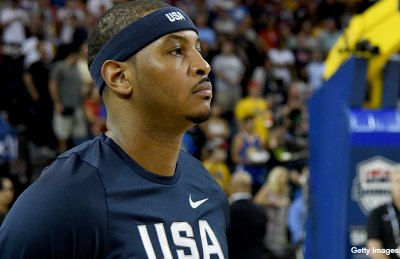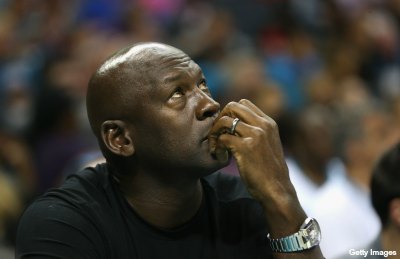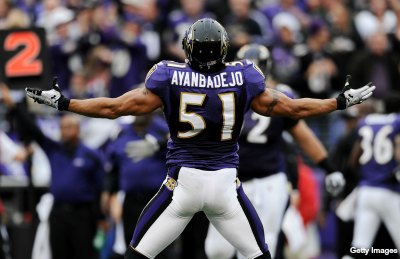It's hard to know what will happen next. That's the constant refrain you'll hear from Daron Roberts, a former NFL coach and owner of a degree from Harvard Law School.
As co-founder of the Center for Sports Leadership and Innovation at the University of Texas, Roberts has praised past efforts by athletes to leverage their influence for political advocacy and activism, and he has called on other athletes to take on more proactive political roles.
Roberts is the guy to call when you're looking for someone to give context to what's happening in the sports world, where some of the biggest stars are breaking from tradition and ending their silence on political matters. A striking image of this growing trend came at this year's ESPY awards, which opened with four NBA superstars -- Carmelo Anthony, Chris Paul, LeBron James, and Dwyane Wade -- standing in front of a simple backdrop to address police violence across the country, and to call on all people to take steps toward social change.
But when it comes to those next steps, the path forward is far from clear. All of us -- Roberts, athletes and the American public -- are in uncharted waters when it comes to laying the groundwork for broad political and social change.
This article says it all man! Sickens me and I shed multiple tears about it all. https://t.co/Tsj9646QoT #ItNeedsToStop #BlackLivesMatter
— LeBron James (@KingJames) July 8, 2016
We are all hurting tonight. More violence is not the answer. #StoptheViolence
— LeBron James (@KingJames) July 8, 2016
The message conveyed by those four NBA stars is bold, moving, and possibly very influential on the public.
"I think the moment was significant," Roberts says. "It was prominent in terms of the timing. One of the biggest nights in sports, and the first thing that you hear are these four prominent athletes that are taking or making a strong political statement."
But Roberts can't say exactly how that change will manifest itself. As athletes begin to find their political voice, they do so without a clear template for action.
"I don't know what that [change] looks like after the confetti hits the floor, what that translates to in terms of leverage, how that moment and that unity will translate in terms of leverage being used by the players," Roberts says.

"It was a bold statement. But it'll be interesting to see to what extent their actions will be guided by that statement."
Imagine LeBron James, Tom Brady, Stephen Curry and Ronda Rousey holding a press conference to announce their united stance on a politically divisive issue. To the modern-day sports fan, it seems entirely out of place from the world of sports.
But it wasn't always that way. In fact, the 1960s was a progressive time both for the rise of the sports superstar, and for the political conflict that now defines the decade. The most shining example is the Ali Summit. In 1967, a group of the nation's top black athletes -- and noted political voice including Jim Brown, Bill Russell, Kareem Abdul-Jabbar, and Ali himself -- met in Cleveland to discuss Ali's refusal to fight for the United States in the Vietnam War.
Ali had come out as a conscientious objector to the draft, arguing that America's failings to serve him and other African Americans the racial justice they deserved was grounds to oppose risking his life for that country. Those athletes wanted to talk to Ali, to make sure his convictions were authentic, and not simply an excuse to dodge the draft.
Once those athletes were convinced, they maintained a united front and supported Ali.
At the time, the Ali Summit was national news -- but not necessarily unthinkable. At the time, a number of prominent athletes were not afraid to espouse their political beliefs.
"If you were growing up and you were watching Muhammad Ali on the big screen, you were very close to a very conscientious time in American political history," Roberts says.
"Looking at the events of the past two years, it's not on the same scale [as the 1960s], but it's reaching the same pitch."
#WeAreTrayvonMartin #Hoodies #Stereotyped #WeWantJustice http://t.co/tH6baAVo
— LeBron James (@KingJames) March 23, 2012
But those two high-water marks are spaced nearly 50 years apart, so much so that multiple generations of sports fans have no recollection of a time when athletes spoke their political minds.
That begs the question: What happened in the middle?
There's a great line, attributed to Michael Jordan, that characterizes the gradual fade of politics from the world of sports:
"Republicans buy my shoes, too."

It's unclear if Jordan actually said that -- he is rumored to have said it to a friend -- but it nonetheless defines a personal mindset that MJ embraced as much as anyone else.
For much of Jordan's career, and of the careers of most major sports stars over the past 30 years, brand trumped politics.
"I've always been perplexed by how athletes aren't more assertive at that level, given that they have a certain amount of economic insulation," Roberts says. "I can understand the risk aversion of your middle-of-the-pack athletes, but it's tough to understand why that top 1 percent, 2 percent of athletes aren't more assertive."
Roberts notes that this trend is changing, in some cases. He points out LeBron's increasingly political activism, along with Carmelo Anthony's efforts to become a social leader off-the-court.
Even Michael Jordan -- the gold standard for political neutrality in the sports world -- recently broke his silence with a firm statement of disappointment and frustration over repeated acts of violence between police and the black community, saying he was "deeply disturbed" and pledging $2 million combined to the NAACP and the Institute for Community-Police Relations.
"I can no longer stay silent," Jordan said.
But for many years, he was -- as were most athletes. Roberts assigns this to a few different factors. He believes that in the immediate aftermath of the civil rights movement, athletes and the rest of society had a "perception that things improved." In other words, the civil rights movement had been deemed a victory -- and the inequities still being fought toward were largely overlooked.
But there was another complicating factor: Money. Or, as Roberts puts it, marketability. As money flowed into professional sports, individual athletes were elevated into positions much larger than their circumstances as sports stars. They became CEOs of major brands built in their own image. And with that transition to big business, athletes began acting less like people, and more like corporate entities.
Over time, the financial implications, and fears of losing marketability, served as deterrents for athletes who might otherwise have become outspoken political voices.
"It's all economic-related, and it either stems from a fear of losing, sponsorships, endorsements, etc., or whether or not their own playing viability could be affected by their political action," Roberts says.
Ironically, the athletes who have traditionally held to this most tend to be the persons most immune to the adverse effects of political polarization. Michael Jordan's brand, Roberts points out, could weather any adversity stemming from Jordan's decision to become more politically involved, should he choose to do so.
It's the lesser sports stars -- the 99 percent -- that have something to lose.
Brendon Ayanbadejo doesn't believe his work as an activist hurt his NFL career. He played 10 years in the league, earning a nice living for himself.

And the prominent LGBT activist -- the first NFL player to speak up on issues of LGBT inequality -- never felt like the NFL, nor the Baltimore Ravens, were discouraging or frustrated by his decision to embrace what was, initially, an unpopular position. (In fact, Ayanbadejo praises the Ravens organization as having been supportive of his own personal convictions, as well as the freedom every Ravens player has to express his own political beliefs. Not every NFL team, he points out, fosters such a supportive environment.)
He also doesn't believe his activism cost him any professional opportunities in the way of endorsements or partnerships, although he says that's not something he ever worried about. His political convictions far outweigh his commitment to football.
"I think we [athletes] have a major responsibility that we have to our country, to our community," Ayanbadejo says. "There are so many things that are more important to being an athlete than the sport itself."
Despite his fearlessness on the issue, Ayanbadejo is part of a class of players that do have much more to lose by taking an unpopular political stand. Stars will continue to be stars, but role players on professional teams can be replaced much more easily, and their politics -- if they rub organizations the wrong way -- could carry a burden not supported by their on-field contributions.
Roberts says it's a concern for many athletes: That by embracing their political convictions and taking on a more vocal role in their communities, they could risk upsetting other parties and hurting their income-earning potential.
Step up to the plate and get involved. Check out the @VICESports discussion #BeTheSo7ution https://t.co/n8jz3TMXVi pic.twitter.com/lHJ936DkEg
— Carmelo Anthony (@carmeloanthony) July 28, 2016
Chris Kluwe is a prime example: In an incisive editorial published by Deadspin, Kluwe contended that he was released by the Minnesota Vikings in 2013 because of his activism for same-sex marriage. In that column, titled, "I Was An NFL Player Until I Was Fired By Two Cowards And A Bigot," Kluwe notes that his net and gross punting average in his final season with the Vikings were close to his career average, which ranks first in Vikings franchise history.
Kluwe also noted that the Vikings special teams coordinator, Mike Priefer, once said of his activism: "To me, it's getting old. He's got to focus on punting and holding."
So it wasn't a big surprise that Kluwe was released. And bad endings like that, unfair as they may be, get stuck in the backs of the minds of athletes who want to speak out themselves, but worry about the consequences. When players have their livelihoods at stake,the fact that those consequences are unfair is irrelevant.
That doesn't mean lesser-known athletes can't, or shouldn't, become politically active. They simply have more to lose than league superstars. Even so, those athletes are getting more comfortable taking a stand, as the WNBA's Minnesota Lynx did in wearing shirts that protested both police brutality and fatal attacks on police officers in Dallas.
Ayanbadejo, who now gives speeches and attends events as part of his LGBT activism, believes that the current political climate will continue to push athletes to take action.
"You have to step up and talk about it," he says. "Why would you be thinking about watching a sport when you're not safe?"
The ultimate question is unknowable. Where do we go from here? Roberts says if we did, it would be a lot easier to prescribe a path forward. Ultimately, it may come down to athletes understanding their power, and how best to use it.
"I go back to the Donald Sterling episode, and the form of protest: Wearing jerseys inside out during warm-ups," Roberts says. "What would have happened if Blake Griffin and Chris Paul had gone to Coach [Doc] Rivers or the press and said, 'We are not playing in this next playoff game until this issue is resolved'?
"You would have seen the decision to ban Sterling accelerated. The leverage for those types of players is so high."
Roberts says it's hard to tie an outcome to individual instances of activism and political rhetoric. If anything, the impact is hard to quantify, but valuable nonetheless: It increases society's expectations to see positive outcomes and change, and to see athletes converting their passion and political capital into tangible results.
Ayanbadejo has a similar outlook.
"I'm not surprised itself by the WNBA, or the NBA, artists, leagues pulling All-Star Games out of states," he says. "We have high expectations about how we expect Americans to act, we feel like we're leaders of the world. You should step up, and you should use this influence through sport to make the world a better place."
With so much turmoil, conflict and adversity, it's hard to say what will be forged in society's pressure-cooker. Ayanbadejo has a sense that things will get worse before they get better, but he can only wonder where athletes will take their political mission from here.
"I keep visualizing what are athletes going to do," he says. "Are we going to boycott something, are we going to say 'Don't support this brand,' or would they go as saying, 'Hey, we're going to boycott games'? … Is it something just as simple as wearing a jersey or a hoodie? When these things keep happening, desperate times call for desperate measures.
"What that will be, I don't know."
Popular On ThePostGame:
-- What If World's Greatest Athlete Never Discovered The Decathlon?
-- 12 NBA Artists To Follow On Instagram
-- With Husband's Support, Brenda Martinez Takes Olympic Road Less Traveled
Follow Jonathan Crowl on Twitter @JonathanCrowl.





